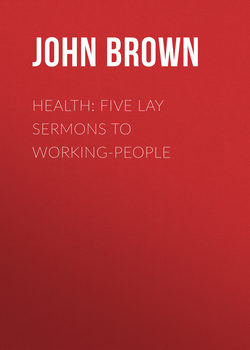Health: Five Lay Sermons to Working-People

Реклама. ООО «ЛитРес», ИНН: 7719571260.
Оглавление
Brown John. Health: Five Lay Sermons to Working-People
PREFACE
SERMON I
SERMON II
SERMON III
SERMON IV
SERMON V
Отрывок из книги
THREE of these sermons were written for, and (shall I say?) preached some years ago, in one of the earliest missionary stations in Edinburgh, established by Broughton Place Congregation, and presided over at that time by the Reverend James Trench; one of the best human beings it was ever my privilege to know. He is dead; dying in and of his work, – from typhus fever caught at the bedside of one of his poor members – but he lives in the hearts of many a widow and fatherless child; and lives also, I doubt not, in the immediate vision of Him to do whose will was his meat and his drink. Given ten thousand such men, how would the crooked places be made straight, and the rough places plain, the wildernesses of city wickedness, the solitary places of sin and despair, of pain and shame, be made glad! This is what is to regenerate mankind; this is the leaven that some day is to leaven the lump.
The other two sermons were never preached, except in print; but they were composed in the same key. I say this not in defence, but in explanation. I have tried to speak to working men and women from my lay pulpit, in the same words, with the same voice, with the same thoughts I was in the habit of using when doctoring them. This is the reason of their plain speaking. There is no other way of reaching these sturdy and weather and work-beaten understandings; there is nothing fine about them outside, though they are often as white in the skin under their clothes as a duchess, and their hearts as soft and tender as Jonathan's, or as Rachel's, or our own Grizel Baillie's; but you must speak out to them, and must not be mealy-mouthed if you wish to reach their minds and affections and wills. I wish the gentlefolks could hear and could use a little more of this outspokenness; and, as old Porson said, condescend to call a spade a spade, and not a horticultural implement; five letters instead of twenty-two, and more to the purpose.
.....
And so now for the first. It is your duty to trust the Doctor, that is, to believe in him. If you were in a ship, in a wild storm, and among dangerous rocks, and if you took a pilot on board, who knew all the coast and all the breakers, and had a clear eye, and a firm heart, and a practised hand, would you not let him have his own way? would you think of giving him your poor advice, or keep his hand from its work at the helm? You would not be such a fool, or so uncivil, or so mad. And yet many people do this very same sort of thing, just because they don't really trust their Doctor; and a doctor is a pilot for your bodies when they are in a storm and in distress. He takes the helm, and does his best to guide you through a fever; but he must have fair play; he must be trusted even in the dark. It is wonderful what cures the very sight of a doctor will work, if the patient believes in him; it is half the battle. His very face is as good as a medicine, and sometimes better, – and much pleasanter too.
One day a laboring man came to me with indigestion. He had a sour and sore stomach, and heartburn, and the water-brash, and wind, and colic, and wonderful misery of body and mind. I found he was eating bad food, and too much of it; and then, when its digestion gave him pain, he took a glass of raw whiskey. I made him promise to give up his bad food and his worse whiskey, and live on pease-brose and sweet milk, and I wrote him a prescription, as we call it, for some medicine, and said, "Take that, and come back in a fortnight and you will be well." He did come back, hearty and hale; – no colic, no sinking at the heart, a clean tongue, and a cool hand, and a firm step, and a clear eye, and a happy face. I was very proud of the wonders my prescription had done; and having forgotten what it was, I said, "Let me see what I gave you." "O," says he, "I took it." "Yes," said I, "but the prescription." "I took it, as you bade me. I swallowed it." He had actually eaten the bit of paper, and been all that the better of it; but it would have done him little, at least less good had he not trusted me when I said he would be better, and attended to my rules.
.....